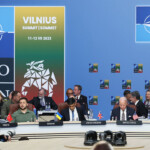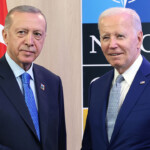‘The appearance of democracy, reflected in elections contested by multiple political parties, masks the reality of virtual one-party, even one-man, rule: Turkey is Erdoğan, just as Hungary is Orbán.’
Hungary’s long-serving prime minister, Viktor Orbán, was among the first foreign leaders to congratulate Recep Tayyip Erdoğan on his re-election as Turkey’s president in May.
For Orbán and his ruling Fidesz party, Erdoğan’s success was welcome proof that gross economic mismanagement, state-orchestrated nepotism and corruption—as well as continuing erosion of judicial independence and human rights—need not be obstacles to a regime’s continued political success, notwithstanding the inconvenience of periodic elections.
Indeed, Erdoğan and Orbán have shown that in countries ruled by authoritarian-populist cliques—a specific variant of populist government—elections are most likely to produce a positive outcome for the incumbent administration.
The regime can hail the result as ‘proof’ of its democratic legitimacy, even if elections in both Turkey and Hungary offer much more convincing evidence of the systematic subversion of democratic norms by governments adept at exploiting a range of resources mostly denied to their political opponents.
The appearance of democracy, reflected in elections contested by multiple political parties, masks the reality of virtual one-party, even one-man, rule: Turkey is Erdoğan, just as Hungary is Orbán.
The authoritarian-populist playbook has four key elements:
- shaping public opinion through dominance of the print and electronic media, internet-based news platforms and other means of mass communication;
- silencing critical voices and weakening or neutralising political opponents;
- nurturing close, mutually-beneficial relationships with new business elites, and
- bolstering long-term support for the regime and its ideology through comprehensive educational, cultural and social policies.
Authoritarian-populist regimes understand that, to win successive elections, the ability to shape public opinion, particularly through dominance of the print and electronic media and other platforms, is crucial.
It has been estimated that ‘the Turkish government controls 90 per cent of the national media’, while most of Hungary’s print and electronic outlets are in the hands of pro-government interests.
In Hungary, as emphasised by the Council of Europe’s commissioner for human rights, Dunja Mijatović, ‘readers and viewers who do not actively look for alternative sources of news (mainly online) receive virtually exclusive government messages via the print, radio and television markets’.
Posters that recently appeared across Hungary, funded by a civil-society organisation closely aligned to Fidesz, offer a stark illustration of how authoritarian-populist governments seek to manipulate public opinion.
Stoking fears that the conflict in neighbouring Ukraine could spread to Hungary, the posters falsely accuse prominent opposition politicians—including the mayor of Budapest and a former prime minister—of being ‘left wing’, ‘pro-war’ and endangering Hungary’s peace and security.
Authoritarian-populist regimes continue to win elections, in part, by discouraging or neutralising their political opponents and silencing critical voices.
The Turkish authorities have not hesitated to use the country’s draconian criminal-justice system to imprison opposition politicians on spurious charges or bar them from standing for office. The regime has also gained notoriety for the number of journalists it has jailed, as well as for its intimidation of journalists and publishers by other means.
These and related measures have forced ‘scores of journalists into exile or out of the profession’, leaving Turkey’s independent media ‘decimated’.
The silencing of dissident voices in Turkey has also prompted a purge of university teachers. Since a failed coup attempt in 2016, behind which Erdoğan detected the conspiratorial hand of an exiled Islamic clerical rival, several thousand Turkish academics have been dismissed from their posts without explanation.
The Orbán administration and its allies, constrained by Hungary’s membership of the European Union and other factors, have used a different set of strategies—including smear campaigns and oppressive inspections by the tax authorities—to intimidate their political opponents and to censor critical voices.
Instead of imprisoning hostile or independent-minded journalists—a move likely to trigger massive diplomatic, political and economic repercussions—the regime has largely succeeded in silencing critical journalists by other means.
Independent media platforms in Hungary have been systematically starved of government advertising and other funds, acquired by business interests loyal to the government or closed in dubious circumstances. According to Mijatović, these measures have produced a sharp decline in the number of independent media platforms in Hungary.
Hungarian university teachers have not been dismissed from their posts because of presumed ideological convictions. But the Orbán regime compelled the prestigious Central European University to relocate from Budapest to Vienna and has taken steps to curtail the autonomy of Hungarian universities, prompting the European Commission to withhold significant funds.
Authoritarian-populist governments are keenly aware of the importance of forging close, mutually-beneficial links with business elites. A recent study found that ‘two decades of continuous rule have afforded the AKP [Erdoğan’s party] an exceptional opportunity to develop and maintain vast patronage networks and to build up a new economic elite that would displace the secular business class and be politically loyal to Erdoğan’.
Similarly, as far back as 2017, the Financial Times noted that, in Hungary, ‘as Fidesz has entrenched its control, a circle of wealthy businesspeople has arisen around the party and the prime minister—in essence, a group of loyalist “oligarchs”’.
The relationship between authoritarian-populist regimes and the new business elites they have nurtured is symbiotic. Companies owned by pro-government businessmen can expect generous state patronage—concessions, subsidies, state contracts, advertising and so on—as well as lenient treatment by state officials, including tax and planning authorities, police and prosecutors.
In return, these businesses provide the ruling party with financial support for election campaigns, favourable coverage in their media outlets and other services.
Authoritarian-populist regimes like to portray themselves as the embodiment of the nation and as the only true patriots among their political peers.
Erdoğan dismissed domestic critics with a brusque comment: ‘We are the people. Who are you?’ Similarly, Orbán has insisted that Fidesz is composed of patriots who ‘passionately love Hungary’ and that this sets it apart from the other political parties.
Such claims are both absurd and disturbing. Far from constituting monolithic entities united by a shared history, culture and ideology, most nation-states are complex social constructs, composed of diverse elements. No single political party can plausibly claim to represent the supposed values of an entire ‘people’ or have a monopoly on patriotism.
In seeking to entrench their political ascendancy, however, the authoritarian-populist regimes in Ankara and Budapest have instituted broad-ranging policies to remake the nation in their own image.
Under Erdoğan and the AKP, the secular-nationalist ideology promoted by the founder of independent Turkey, Kemal Atatürk, and his followers from the early 1920s has been gradually displaced.
Its successor is ‘neo-Ottomanism’, a ‘counter-narrative of Ottoman-Islamic-Turkish identity and values’ whose twofold purpose is ‘restoring Turkey to its historic greatness’ and helping the Turkish nation ‘return to a lost home’. The construction of what Erdoğan has called a ‘new civilisation’ has led to the purge of secular intellectuals, massive expansion of Islamic schools and increased emphasis on religious education in the state sector.
Similarly, the Orbán government has invested enormous effort and resources in trying to refashion Hungarian society in its own image. This has involved commissioning new course books for schools that reflect Fidesz’s hyper-nationalist, populist and anti-globalist ideology and replacing Hungary’s mostly pro-western, liberal intelligentsia with a new cadre of intellectuals who share the regime’s core values.
Fidesz’s grandiose social engineering has reserved a major role for Hungary’s deeply conservative churches, with a massive increase in denominational schools since the party returned to power in 2010.
In view of the many fundamental differences between the two countries, it is striking how similar are the AKP and Fidesz in structure, objectives and strategies. Although paying lip-service to democracy, both parties—like their respective leaders—seem intent on retaining power indefinitely.
Under an elaborate carapace of laws, processes and institutions intended to create the illusion of functioning democracies, Erdoğan and Orbán have overseen the creation of ruthlessly efficient political machines whose overriding purpose is the perpetuation of their increasingly autocratic rule.
For authoritarian-populist regimes, populism is largely a means to achieve authoritarian ends. The almost pathological pursuit of uncontested power by Erdoğan and Orbán has resulted in the systematic erosion of democratic norms in Turkey and Hungary, drastic curtailment of human rights and an unrelenting war on dissident voices and the platforms that support them.
As long as electorates are fed an unwholesome diet of half-truths and outright lies by their government and the state-controlled media, and denied access to impartial or accurate information, such authoritarian-populist leaders—however venal, authoritarian or economically incompetent—will remain alarmingly popular with many, particularly poorly-educated voters.
This article was originally published by Social Europe.
The views and opinions expressed above are the author’s and do not reflect those of the Free Turkish Press.


